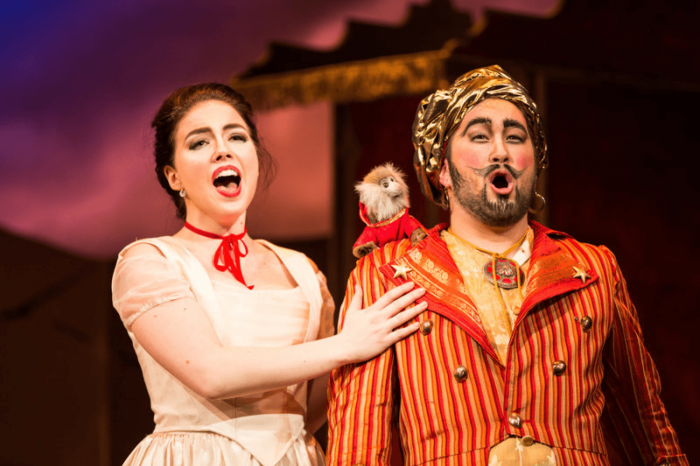Opera McGill’s January production of Donizetti’s Italian comic opera L’elisir d’amore is a light-hearted tale of love and alchemy, all centred around the aching heart of a pitiable young man and the conniving acts of a foreign swindler. The talent of the Conductor, Patrick Hansen, and the Stage Director, François Racine, is evident throughout the skillfully performed production, and while the script itself was free of any real drama of excitement, the joyful and highly emotive portrayals by the performers brought the production to life.
The opening of L’elisir d’amore is familiar for anyone who has watched the Disney version of Beauty and the Beast (1991). Among a simple backdrop and bright lighting the chorus jauntily sings a morning song until they are distracted by the beautiful Adina (Chelsea Rus) and the latest novel she’s reading. Just like Belle, Adina is a bookish loner; however, in this friendly Italian town the people adore Adina for her literacy and gather round to hear her read about the medieval legend of Tristan, who won over his love Isolde with a love potion. This opening scene sets the stage for the remainder of the story, which centers around the dumb but sympathetic character of Nemorino (Jan van der Hooft) and his quest to win Adina’s heart before she marries the buffoonish Gaston-eque Sergeant Belcore (Bruno Roy).
The simple love story takes a twist when Dr. Dulcamara (Jesùs Vincente Murillo), a dispenser of potions and cure-alls, arrives in the town promising elixirs for every ailment. Murillo does an excellent job in his opening song, alternating between slinking coyly through the chorus and jumping into center stage to deliver his alchemic promises. His character is brought to life by the clever costuming choice of Ginette Grenier, who dressed Dulcamara in gold-accented bright orange, and even went so far as to place a stuffed monkey upon his shoulder. Grenier’s costume arrangement also skillfully brought Giannetta (Megan Miceli) to the forefront as a central character early on by dressing her in a pale blue dress with a pink corset, a stark but not burdensome contrast to the multiple shades of beige worn by the rest of the female chorus members. To her credit, in spite of only having one brief solo performance, Miceli continually highlighted her character with her skillful acting, delivering the most emotive performance of the cast despite being largely put on the sidelines.
In terms of purely operatic skill, Rus stole the show through her powerful voice and strong projection—in one moment her song reached such heights that some audience members reached to protect their ears from the vibrations of her vibrato. A stand-out scene from the show came when Adina joined Dulcamara for a humorous song, “I’m Rich, and You Are Beautiful,” at which point their voices were able to blend beautifully and shine over the chorus. Roy also delivered a consistently funny performance, continuously producing laughs from the audience over his comical gestures as he leers and literally lunges at Adina.
Much credit has to be given to the chorus as well, who brought consistent energy to the performance. Unfortunately, their energy often overtook the voices of the main characters in scenes where they were meant to be singing to pieces in conjunction with each other. This particularly affected van der Hooft, who unfortunately could only be properly heard when he was singing alone. The biggest flaw to the opera overall ultimately came from the repeated moments where three different characters in addition to the chorus were meant to be singing multiple lines separate from each other. Rus and Murillo’s voices were strong enough to fight through the rest, however every other solo singer’s voice was inevitably lost in the fray. Though the various lines all blended beautifully together, the fact that almost every single song ended in this way quickly became repetitive and made the story confusing as times, as it wouldn’t be clear which character was saying which line; the result being in that some scenes the plot would seem to dramatically change until it was sorted out what thought belonged to whom.
The talent of all the performers and the crew was evident throughout the whole production. While the story itself is somewhat bland and predictable, the bold and descriptive performances of the players illuminated the story and brought it to another level. For a charming tale with outstanding vocal and acting performances, L’elisir d’amore does a fantastic job, and is well worth the ticket price.
L’elisir d’amore is running at Pollack Hall (555 Rue Sherbrooke) from Jan. 29 – Jan. 31. Tickets range from $29.65 – $41.55. The show can also be live-streamed Friday and Saturday night through CBC at http://ow.ly/XH2PO.









